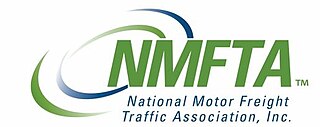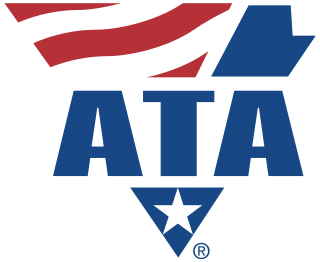
Road traffic safety refers to the methods and measures used to prevent road users from being killed or seriously injured. Typical road users include pedestrians, cyclists, motorists, vehicle passengers, and passengers of on-road public transport.

Utility cycling encompasses any cycling done simply as a means of transport rather than as a sport or leisure activity. It is the original and most common type of cycling in the world. Cycling mobility is one of the various types of private transport and a major part of individual mobility.

In transportation, freight refers to goods conveyed by land, water or air, while cargo refers specifically to freight when conveyed via water or air. In economics, freight refers to goods transported at a freight rate for commercial gain. The term cargo is also used in case of goods in the cold-chain, because the perishable inventory is always in transit towards a final end-use, even when it is held in cold storage or other similar climate-controlled facilities, including warehouses.

The NRMA is an Australian organisation offering roadside assistance, advocacy for motorists and road-users, motoring advice, car servicing, International Driving Permits, travel and other services in New South Wales and the Australian Capital Territory. It is a member-owned mutual company limited by guarantee. It was formed in 1920.

An advanced stop line (ASL), also called advanced stop box or bike box, is a type of road marking at signalised road junctions allowing certain types of vehicle a head start when the traffic signal changes from red to green. Advanced stop lines are implemented widely in Denmark, the United Kingdom, and other European countries.

Shared space is an urban design approach that minimises the segregation between modes of road user. This is done by removing features such as curbs, road surface markings, traffic signs, and traffic lights. Hans Monderman and others have suggested that, by creating a greater sense of uncertainty and making it unclear who has priority, drivers will reduce their speed, in turn reducing the dominance of vehicles, reducing road casualty rates, and improving safety for other road users.

Transportation demand management or travel demand management (TDM) is the application of strategies and policies to increase the efficiency of transportation systems, that reduce travel demand, or to redistribute this demand in space or in time.
A freight forwarder or forwarding agent is a person or a company who co-ordinates and organizes the movement of shipments on behalf of a shipper by liaising with carriers. The carriers may use a variety of shipping modes, including ships, airplanes, trucks, and railroads, and often use multiple modes for a single shipment. A freight forwarder does not move the goods but acts as an agent in the logistics network and will carry out freight consolidation, rate negotiations, shipment tracking, customs and other documentation, among other tasks. FIATA describes a freight forwarder as the "Architect of transport".

The FIATA International Federation of Freight Forwarders Associations is a non-governmental organisation representing freight forwarders worldwide. According to the FIATA Annual Report 2021, FIATA counted 109 Associations Members representing the freight forwarding industry within a territory and 5959 Individual members, representing freight forwarding and logistics companies.

Freight companies are companies that specialize in the moving of freight, or cargo, from one place to another. These companies are divided into several variant sections. For example, international freight forwarders ship goods internationally from country to country, and domestic freight forwarders, ship goods within a single country.
The Society of Motor Manufacturers and Traders (SMMT) is the trade association for the United Kingdom motor industry. Its role is to "promote the interests of the UK automotive industry at home and abroad."
Make Roads Safe is a global road safety campaign established with the aim of securing political commitment for road traffic injury prevention around the world.

SBB Cargo is a subsidiary of Swiss Federal Railways (SBB) specialising in railfreight and is operated as the Freight division. Swiss Federal Railways is a former state-owned and -controlled company that was transformed in 1999 into a joint-stock company under special legislation following the first Swiss railway reform and divided up into three independent divisions: Passenger, Freight and Infrastructure. The headquarters of Swiss Federal Railways SBB Cargo AG, the Freight division's official designation, are in Olten. In 2013, SBB Cargo had 3,061 employees and achieved consolidated sales of CHF 953 million. In Switzerland, SBB Cargo is the market leader in rail freight, transporting over 175,000 tons of goods every day. This corresponds to the weight of 425 fully loaded jumbo jets.

The National Motor Freight Traffic Association, Inc. (NMFTA)™ is a nonprofit membership organization headquartered in Alexandria, Virginia. Since 1956, NMFTA has represented the interests of the less-than-truckload (LTL) motor carrier industry, and for-hire interstate and intrastate carriers. There are two ways to join NMFTA: membership and participation in the National Motor Freight Classification (NMFC)®.
The Salter Report was named after Arthur Salter, who chaired an influential conference of road and rail experts in 1932 which reported in 1933. The report directed British government policy for transport funding for decades to follow.

The American Trucking Associations (ATA), founded in 1933, is the largest national trade association for the trucking industry. ATA represents more than 37,000 members covering every type of motor carrier in the United States through a federation of other trucking groups, industry-related conferences, and its 50 affiliated state trucking associations. Former Governor of Kansas Bill Graves was replaced by Chris Spear as the ATA's president and CEO in July 2016.
Longer Heavier Vehicles in the UK (LHV) is a large goods vehicle category in the United Kingdom. Longer Heavier Vehicles are not currently allowed to operate on UK roads because they exceed the mandated limit of six axles and 44 tonnes of gross weight and length of 16.5 m for articulated lorries, or 18.75 m for drawbar lorries.

The Denby Eco-Link, dubbed the super lorry by the mainstream media, is a commercial vehicle designed and built by Denby Transport of the United Kingdom. The Eco-Link is a 60 tonne fully laden, 25.25m long, 8 axle B-Train type of semi-trailer truck, in which a tractor unit pulls two semi-trailers, using fifth wheel couplings on both trailers. As one prototype of the UK Longer Heavier Vehicle (LHV) vehicle definition, which are longer and heavier than normal Large Goods Vehicles, it is not currently permitted to be used in the UK. As of 2009, the largest ordinary lorries in the UK have 6 axles and a maximum laden weight of 44 tonnes, and can be 16.5m long as single trailer semi-trailer trucks, or 18.75m as drawbar lorries.

Cycling infrastructure is all infrastructure cyclists are allowed to use. Bikeways include bike paths, bike lanes, cycle tracks, rail trails and, where permitted, sidewalks. Roads used by motorists are also cycling infrastructure, except where cyclists are barred such as many freeways/motorways. It includes amenities such as bike racks for parking, shelters, service centers and specialized traffic signs and signals. The more cycling infrastructure, the more people get about by bicycle.
The history of cycling infrastructure starts from shortly after the bike boom of the 1880s when the first short stretches of dedicated bicycle infrastructure were built, through to the rise of the automobile from the mid-20th century onwards and the concomitant decline of cycling as a means of transport, to cycling's comeback from the 1970s onwards.













